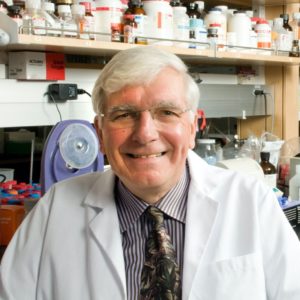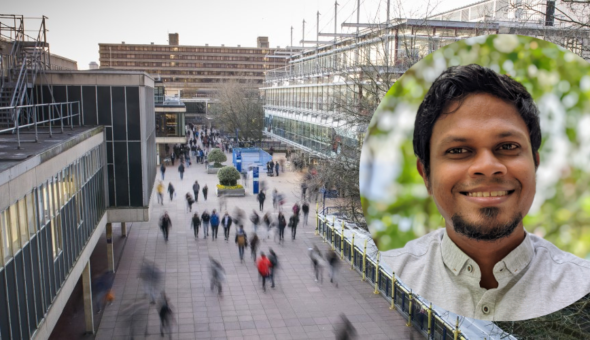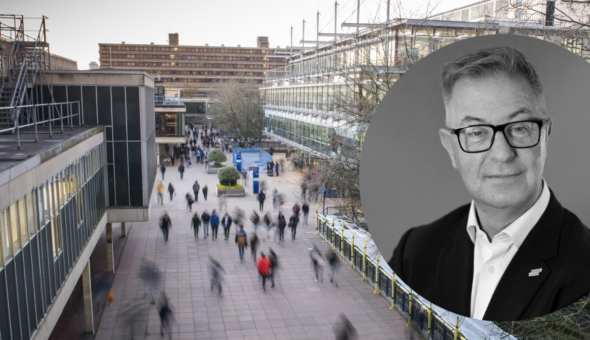Donor Laurence Hurley was among our first graduates, back when the University was based in Bristol. He is Professor Emeritus at the University of Arizona's College of Pharmacy in Tucson, Arizona, and has spent a distinguished career researching new cancer-fighting drugs. He shares his memories of struggling with biology, a fascination with explosions and drinking the bar dry...
 Why did you choose to study at Bath?
Why did you choose to study at Bath?
In 1963 when I applied to pharmacy schools, you could either go to a College of Science and Technology to qualify to become a member of the Pharmaceutic Society (MPS), so you could practise pharmacy, or you could apply to a university to work towards a BPharm degree.
In the same year, the Committee on Higher Education published what was known as the Robbins Report. It was recommended that the Bristol College of Science and Technology should become a University and award BPharm degrees. As a result, I decided to attend what was shortly going to become Bath University of Technology and obtain the flexibility for career choices after graduation.
Did you have a particular career in mind when you chose your course?
Chemistry was my passion when I was a teenager, in particular making explosive mixtures for blowing up neighbourhood drains and other fixtures such as crazy paving. In future years, this would have classified me as a potential terrorist!
This behaviour originated from my fascination with freely available chemistry sets and then explosive mixtures, for which the constituent parts could be purchased without questions at chemist’s shops. I didn't have really much idea what I wanted to do as a career goal, until I talked to my local chemist who not only sold me the components, but also suggested pharmacy as a career option.
Can you tell us about your experience of studying here? How did you find life at the Bristol campus?
My 1967 Pharmacy class had about 30 students, mostly male. Everyone except me had an A-Level in biology, whereas mine were In in pure and applied maths, physics and chemistry. Because of my deficiency in biology, I had a tough time in my first year at Bath – and was told by the head of the school (Dan Norton) after the mock exams at the end of first term that I was unlikely to make it past the first year. After Christmas, Jimmy Mearns – a lecturer in Human Biology – took me under his wing and tutored me, and I made it successfully into the second year.
My inspiration for doing research came from Terry Jeffries and Margaret Hansen in the School of Pharmacy & Pharmacology, who supervised my third-year honours project, 'A Macroscopical and Microscopical study of Belladonna Root and a Gas Chromatographic analysis of the Volatile Oils from Fennel Seeds'.
Among my leisure activities, I enjoyed a few favourite pubs in Bristol. There were the Wine Bars in central Bristol, which just served sherry and port, and the Llandoger Trow, which only served cider. Only men were allowed inside back then in the late '60s. RAG Week was the highlight of the year and 'drinking a pub dry' was one of the main activities.
I lived near to the Bristol Suspension Bridge with three other students from my class. Those were a great three years, which I thoroughly enjoyed.
How has the University changed since your time here?
I would have loved to be on a real campus as exists now in Bath, but Bristol was a great place to be and the faculty made it enjoyable and inspiring.
A half-century ago, confidentiality was not a big issue and grades were posted by name on the board outside the head of the school’s office from the highest to the lowest, with a red line separating the passes and those failing.
In one of my classes in pharmaceutics we were told in the first lecture that, if we had a good question to raise one hand, but if was stupid to raise two hands. We thought the lecturer was joking until the first 'stupid question' was asked, and he asked why only one hand was raised!
Describe your career journey since graduating.
It has been 55 years since I graduated as part of Bath University of Technology’s first class. I went on to get a PhD in Pharmacognosy at Purdue University (1970) and did a postdoc at the University of British Columbia (1970-71). Since then, I have served on the faculty at four US universities in Maryland, Kentucky, Texas and Arizona.
In my career I am most proud of being awarded honorary degrees from Bath in 1996 and Purdue in 2015, then the Royal Society of Chemistry’s Nucleic Acids Award in 2011. More recently, I became a Fellow of the National Academy of Inventors in 2020.
I’ve spent the bulk of my research career in drug discovery and development, in which I have moved two drugs into clinical trials from my research and been the scientific founder of three companies. My initial thesis work at Bath was the starting point for my career as a scientist and the critical turning point in my research development – starting my five-decade journey from belladonna root to selective gene targeting!
My three years at the University were the basis for my future career, which I hope not only has benefitted me but, more importantly, cancer patients. Pidnarulex, a first-in-class targeted drug, was initially derived from my research at Texas and Arizona, and received an FDA Fast Tracked Designation for treatment of breast and ovarian cancer patients with BRCA1/2 mutations.
How did your studies help to develop you, professionally and/or personally?
I personally enjoyed the no-nonsense approach, and what I valued most was the emphasis on teaching an underlying understanding of how drugs worked rather than simply memorising their names and properties. This really paid off as a postgraduate, where I found that I was much better equipped than many of my fellow students in the US.
What motivates you to donate to Bath, and what would you say to others thinking of doing the same?
Bath gave a lot to me, more than I ever could ever have imagined when I took that flight from Heathrow to Chicago in September 1967. Financially I have done what I was able to do in the past 20 years or so for Bath students and I hope the success of my Reglagene oncology drugs will allow me to do much more in the future.
For those of us who were Bath University of Technology graduates, it would be nice to collectively leave a legacy that marks the University’s very early years.
Respond



